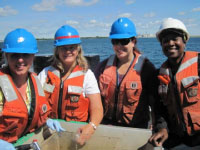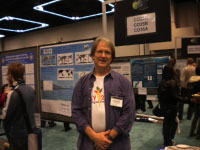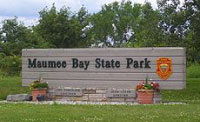It’s been the busiest year ever for COSEE Great Lakes, with expanded opportunities for teacher professional development, refinement of our “School for Scientists” model, and keeping up with Network involvement on many initiatives. It would be easy to make a list of all the things we did this year in our eight-state program, but there are more important outcomes than a full list would display on its own. Year 5 brings us to a time of reflection on what we’ve done best and where the biggest steps can take us.
| |  |
| Superior Science Expedition members display some of their work after disembarking from their floating classroom. Photo: Minnesota Sea Grant |
Shipboard Workshops
Our signature program for professional development is based on a partnership with USEPA’s Great Lakes Regional Program Office, in which the agency invites 15 formal and informal educators aboard the 180-foot R/V Lake Guardian for a week of learning side-by-side with scientists. In 2009 we had two such workshops, one on Lake Superior and one on Lake Huron, the two northernmost Great Lakes. Educators from six of the eight states bordering the Lakes participated, along with ten research scientists.
After orientation to the vessel’s excellent facilities for research, education and group living, and trying on the orange gumby suits as part of safety training, the educators were introduced to the array of physical and biological characteristics of the lakes that are the basis of the EPA’s science. Through discussions with scientists and among themselves, educator teams developed hypotheses about the relationships among the variables that might be tested through the week’s data collection at sea. Teachers could suggest sampling sites and request particular data types and schedules, and the crew of the Guardian cooperated in pursuit of the data.
 | |
A team of teachers sorts benthic organisms. Photo: COSEE Great Lakes | |
Following their research experience, a team of Ohio teachers made the following comment: “Science is all about looking at data, finding patterns, and providing possible explanations. We felt that our experience on the
Lake Guardian offered an ideal opportunity to develop a great activity for our students, with the added bonus of being able to actually relate to our students how the data was actually gathered.”
Scientists also gain from the Lake Guardian workshops. They report being impressed with the quality of educators who participate, and learning about how teachers are trained, what vocabulary they use, and how they overcome many constraints to conduct their science programs. Scientists from the shipboard workshops often seek additional ways to work with educators, as in the Collaborative Presentation.
| |  |
| Cory Kolodji, Chisholm High School teacher, Minnesota, at Ocean Sciences. Photo: Joel Hoffman, USEPA |
Collaborative Presentation at Ocean Sciences
Following the experience with the Lake Guardian on Lake Superior, Minnesota teacher Cory Kolodji and EPA research scientist Joel Hoffman made a professional presentation about the hypotheses-based workshop at the AGU Ocean Sciences meeting in Portland, Oregon.
Hoffman’s reaction to the experience crystallizes how COSEE Great Lakes helps researchers make a broader impact:
I have not previously participated in an Education and Outreach session. If not for our talk, I doubt I would have attended a single Outreach and Education presentation. Yet, because of this professional presentation, I remained in the entire session. More importantly, I enjoyed it. As I heard through the afternoon, science education is about finding common ground between the scientific material and each student's world view. Perhaps this is intuitive to those with a pedagogical background, but as a scientist, I perceive our work lies within an objective realm, not embedded in the social matrix of a student's life. I found this perspective useful, particularly the realization that a social context may place broad bounds on people's connections to science and at the same time create specific opportunities for communicating science to a public audience.
Great Lakes Literacy Principles
The Ocean Literacy Essential Principles and Fundamental Concepts have been extremely useful in assisting COSEE Great Lakes to structure the content of its programs. The science concepts and mechanisms for study of the Great Lakes are essentially the same as those for studying the ocean. However, when we seek to impact the curriculum through relevance to students, and when we apply constructivist techniques for building on prior experience, students and teachers in the region – which is home to more than one quarter of the U.S. population - see themselves as working toward Great Lakes literacy. We may think globally for Ocean Literacy, but we act locally for the Great Lakes.
COSEE-California is providing a subcontract to COSEE Great Lakes to meld the successful California-based Communicating Ocean Sciences (COS) course and the Ocean Literacy Principles into applications for the North Coast. The COS course is still in the planning stages at the University of Michigan, but Great Lakes literacy is now being defined. Master teacher Lyndsey Manzo led preliminary efforts in 2009, working with representatives of several Ohio agencies for the development of a draft set of Lake Erie Literacy Principles and Concepts, and COSEE Great Lakes staff translated those for all the lakes collectively, generally matching the Ocean Literacy list point-for-point. We felt strongly that an 8th Essential Principle was necessary for us, and we think people will be pleased to include “The Great Lakes are socially, economically, and environmentally significant to the region, the nation and the planet” in their Great Lakes teaching beyond what a parallel to OL6 will include. Each Great Lakes state has identified five scientists and five educators to review the drafts, and a final set of principles and concepts will be published in brochure and Internet format later this spring. Watch for our Roundtable presentation at NMEA!
On the Horizon: The Great Lakes Education Summit
| |  |
| Maumee Bay State Park, Oregon, OH |
As we compile our accomplishments and envision what could be built through a renewal proposal for COSEE in the Great Lakes, we are also organizing for a September event that will bring together about 60 of the top scientists and educators with whom we have worked over these five years. The Great Lakes Education Summit will be a celebration of collaboration and a time for building new plans for extension of our accomplishments. We’ll produce documents that capture our best practices and recommendations in areas of professional development, curriculum, collaboration, technology, and serving under-represented groups. Our group reflections will address trends, challenges and recommendations for what should happen in Great Lakes education in coming years. This should be an exciting and thoughtful time among friends and colleagues, and the Maumee Bay State Park setting on Lake Erie will keep us mindful of the reason COSEE Great Lakes came to be.
COSEE Great Lakes in Print
In addition to our regular flow of newsletter and web materials, COSEE Great Lakes has published research and curriculum valuable to the entire COSEE Network. Evaluator Howard Walters developed a research design that tracked the conceptual growth of educators through week-long workshops, and his research article, Concept Mapping: Mixed Methods Data for Measuring Teacher Learning in an NSF-Funded Professional Development Program (COSEE Great Lakes), was published in the National Forum of Teacher Education Journal, 19(3).
Our Educator House-calls are a means of bringing education information and skills to scientists at their place of work. Science Liaison Dr. Rochelle Sturtevant published a technical report about the process and outcomes of a recent house-call.
Fresh and Salt, a compilation of two lessons for each Ocean Literacy principle, selected for relevance to the Great Lakes and intended for use in grades 5-10 on any coastline, is in the final editing process. We’ll make this set available online in early autumn!
Rosanne Fortner, COSEE Great Lakes Director, edited a special issue of Science Activities journal for Ocean Literacy. Four COSEEs, an NSF GK-12 program, a NOAA Environmental Literacy grantee, and NOAA partner Paula Keener-Chavis contributed exemplary lesson plans, one for each Essential Principle of Ocean Literacy. Most institutional libraries have full-text access to the journal, and we hope it gets wide recognition for both COSEE and the new publisher, Taylor & Francis.

